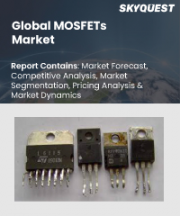
|
시장보고서
상품코드
1500803
초접합 MOSFET 시장 : 산업 분석, 규모, 점유율, 성장 및 동향 예측(2024-2033년)Super Junction MOSFET Market: Global Industry Analysis, Size, Share, Growth, Trends, and Forecast, 2024-2033 |
||||||
Persistence Market Research는 수퍼 접합 MOSFET 세계 시장에 대한 종합적인 보고서를 발표했습니다. 이 보고서는 시장 성장 촉진요인·동향·시장 성장 촉진요인·과제를 포함한 중요한 시장 역학을 철저히 평가하고 시장 구조에 대한 상세한 통찰을 제공합니다.
주요 인사이트
- 초접합 MOSFET 시장 규모(2024E) : 35억 달러
- 예측 시장 규모(2033F) : 82억 달러
- 세계 시장 성장률(CAGR 2024-2033) : 9.9%
초접합 MOSFET 시장 - 보고 범위:
초접합 MOSFET은 전원, 모터 구동, 재생 가능 에너지 시스템 등 다양한 고효율 전력 변환 용도에서 중요한 역할을 합니다. 이 소자들은 기존의 MOSFET에 비해 온 저항이 낮고 스위칭 손실이 감소된 우수한 성능을 제공하도록 설계되어 에너지 효율과 시스템 신뢰성을 향상시킬 수 있습니다. 초접합 MOSFET 시장은 저전압, 중전압, 고전압 MOSFET을 포함한 다양한 제품을 제공하며 산업, 자동차, 가전 및 재생 가능 에너지 분야를 지원합니다.
시장 성장 촉진요인:
초접합 MOSFET 세계 시장은 산업 및 소비자용 전자기기 응용 분야에서 에너지 효율적인 전력 변환 솔루션에 대한 수요 증가와 같은 몇 가지 중요한 요인에 의해 추진되고 있습니다. 전기자동차와 재생 가능 에너지 시스템의 채용이 증가하고 있는 것도 시장 확대의 원동력이 되고 있습니다. 첨단 트렌치 구조와 혁신적인 제조 기술 개척과 같은 기술 발전은 성능과 비용 효율성을 향상시켜 시장 성장을 가속하고 있습니다. 게다가, 소형·경량의 전자기기에 대한 요구의 고조가 고효율 파워·컴포넌트 수요를 높여 시장의 밝은 전망에 기여하고 있습니다.
시장 성장 억제요인:
유망한 성장이 예상되는 초접합 MOSFET 시장은 높은 초기 비용, 복잡한 제조 공정 및 대체 전력 반도체 기술과의 치열한 경쟁과 관련된 문제에 직면하고 있습니다. 차량용 및 산업 용도에 요구되는 엄격한 품질·신뢰성 기준은 제조업체에 추가적인 비용과 컴플라이언스 부담을 부과합니다. 또한 원료 가격 변동과 공급망 혼란은 제조 비용과 시장 수익성에 영향을 줄 수 있습니다. 이러한 문제를 해결하려면 지속적인 기술 혁신, 비용 최적화, 경쟁 우위 및 시장 지속가능성을 유지하기 위해 시장 기업 간의 전략적 협력이 필요합니다.
시장 기회:
초접합 MOSFET 시장은 자동차 부문의 전기 발전, 재생 가능 에너지 인프라 투자 증가, 스마트 디바이스 및 IoT 용도의 보급으로 큰 성장 기회를 제공합니다. 디지털 제어 기술과 첨단 패키징 솔루션의 통합은 초접합 MOSFET의 성능과 응용 범위를 강화하고 시장 확대의 새로운 길을 열었습니다. 반도체 기업 간의 전략적 제휴, 합병 및 인수는 지속적인 R&D 투자와 함께 새로운 기회를 활용하고 역동적 인 초접합 MOSFET 전망으로 시장을 선도하는 데 필수적입니다.
이 보고서에서 다루는 주요 질문
- 초접합 MOSFET 시장의 세계 성장을 가속하는 주요 요인은 무엇인가?
- 다양한 분야에서 초접합 MOSFET의 채택을 촉진하는 제품 유형과 용도는?
- 기술 진보로 초접합 MOSFET 시장 경쟁 구도은 어떻게 변화하고 있는가?
- 초접합 MOSFET 시장에 기여하는 주요 기업은 어딘가, 그리고 시장의 관련성을 유지하기 위해 어떤 전략을 채택하고 있는가?
- 세계의 초접합 MOSFET 시장의 새로운 동향과 미래성은?
목차
제1장 주요 요약
제2장 시장 개요
- 시장 범위/ 분류
- 시장의 정의/ 범위/ 제한
제3장 시장 배경
- 시장 역학
- 시나리오 예측
- 기회 맵 분석
- 제품 수명주기 분석
- 공급망 분석
- 투자 실현 가능성 매트릭스
- 밸류체인 분석
- PESTLE과 Porter's Five Forces 분석
- 규제 상황
- 지역 친시장 전망
- 생산·소비 통계
- 수입과 수출 통계
제4장 세계의 초접합 MOSFET 시장 분석
- 과거 시장 규모 가치와 수량 분석(2019-2023년)
- 현재 및 미래 시장 규모 가치 및 수량 예측(2024-2033년)
- 연간 성장 동향 분석
- 절대 $ 기회 분석
제5장 유형별 세계 초접합 MOSFET 시장 분석
- 소개/ 주요 조사 결과
- 2019-2023년에 있어서의 유형별 시장 규모(가치)와 수량(단위)의 역사적 분석
- 현재 및 미래 시장 규모, 가치 및 수량(단위)의 분석과 예측, 유형별(2024-2033년)
- 고전압 초접합 MOSFET
- 저전압 초접합 MOSFET
- 2019-2023년의 유형별 전년대비 성장 동향 분석
- 유형별 절대 기회 분석(2024-2033년)
제6장 기술별 초접합 MOSFET 세계 시장 분석
- 소개/ 주요 조사 결과
- 2019-2023년의 기술별 시장 규모 가치와 수량(단위)의 역사적 분석
- 현재 및 미래 시장 규모, 가치 및 수량(단위)의 분석과 예측, 기술별(2024-2033년)
- 기존 파워 MOSFET
- 다중 에피택시 기술
- 딥 트렌치 기술
- 2019-2023년에 있어서의 기술별 전년대비 성장 동향 분석
- 기술별 절대적 $기회 분석(2024-2033년)
제7장 세계의 초접합 MOSFET 시장 분석(재료별)
- 소개/ 주요 조사 결과
- 2019-2023년에 있어서의 재질별 시장 규모와 수량(단위)의 역사적 분석
- 현재 및 미래 시장 규모, 가치 및 수량(단위)의 분석과 예측(재질별(2024-2033년))
- 기판 재료
- 전이층/산화층
- 전극 재료
- 기타
- 2019-2023년에 있어서의 재질별 연간 성장 트렌드 분석
- 2024-2033년년에 있어서의 재료별 절대적인$기회 분석
제8장 용도별 세계 초접합 MOSFET 시장 분석
- 소개/ 주요 조사 결과
- 2019-2023년에 있어서의 용도별 시장 규모와 수량(단위)의 역사적 분석
- 현재 및 미래 시장 규모, 가치 및 수량(단위)의 분석과 예측, 용도별(2024-2033년)
- 조명 공급
- 전원
- 디스플레이 디바이스
- 기타
- 용도별 전년대비 성장 동향 분석(2019-2023년)
- 용도별 절대적인 $기회 분석(2024-2033년)
제9장 지역별 초접합 MOSFET 시장 분석
- 소개
- 2019-2023년에 있어서의 지역별 시장 규모와 수량(단위)의 역사적 분석
- 현재 시장 규모 가치와 수량(단위)의 지역별 분석과 예측(2024-2033년)
- 북미
- 라틴아메리카
- 유럽
- 아시아태평양
- 중동 및 아프리카
- 지역별 시장의 매력 분석
제10장 북미 초접합 MOSFET 시장 분석(국가별)
제11장 라틴아메리카의 초접합 MOSFET 시장 분석(국가별)
제12장 유럽의 초접합 MOSFET 시장 분석(국가별)
제13장 아시아태평양의 초접합 MOSFET 시장 분석(국가별)
제14장 중동 및 아프리카의 초접합 MOSFET 시장 분석(국가별)
제15장 주요국의 초접합 MOSFET 시장 분석
- 미국
- 캐나다
- 브라질
- 멕시코
- 독일
- 영국 &
- 프랑스
- 스페인
- 이탈리아
- 중국
- 일본
- 한국
- 싱가포르
- 태국
- 인도네시아
- 호주
- 뉴질랜드
- GCC 국가
- 남아프리카
- 이스라엘
제16장 시장 구조 분석
- 경쟁 대시보드
- 경쟁 벤치마킹
- 주요 기업의 시장 점유율 분석
제17장 경쟁 분석
- 경쟁의 상세
- Alpha and Omega Semiconductor
- Fuji Electric Co. Ltd.
- IceMOS Technology Ltd.
- Infineon Technologies AG
- NXP Semiconductors
- On Semiconductor Corporation
- Rohm Co Ltd.
- STMicroelectronics
- Toshiba Corporation
- Vishay Intertechnology Inc.
제18장 사용된 전제조건과 약어
제19장 조사 방법
JHS 24.07.04Persistence Market Research has recently released a comprehensive report on the worldwide market for Super Junction MOSFETs. The report offers a thorough assessment of crucial market dynamics, including drivers, trends, opportunities, and challenges, providing detailed insights into the market structure.
Key Insights:
- Super Junction MOSFET Market Size (2024E): USD 3.5 Billion
- Projected Market Value (2033F): USD 8.2 Billion
- Global Market Growth Rate (CAGR 2024 to 2033): 9.9%
Super Junction MOSFET Market - Report Scope:
Super Junction MOSFETs play a crucial role in various high-efficiency power conversion applications, including power supplies, motor drives, and renewable energy systems. These devices are designed to offer superior performance with lower on-resistance and reduced switching losses compared to conventional MOSFETs, enabling improved energy efficiency and system reliability. The Super Junction MOSFET market caters to industrial, automotive, consumer electronics, and renewable energy sectors, providing a range of products, including low voltage, mid voltage, and high voltage MOSFETs.
Market Growth Drivers:
The global Super Junction MOSFET market is propelled by several key factors, including the growing demand for energy-efficient power conversion solutions in industrial and consumer electronics applications. The increasing adoption of electric vehicles and renewable energy systems further drives market expansion, as Super Junction MOSFETs are essential for efficient power management in these sectors. Technological advancements, such as the development of advanced trench structures and innovative fabrication techniques, offer improved performance and cost-effectiveness, fostering market growth. Moreover, the rising need for compact and lightweight electronic devices enhances the demand for high-efficiency power components, contributing to the market's positive outlook.
Market Restraints:
Despite promising growth prospects, the Super Junction MOSFET market faces challenges related to high initial costs, complex manufacturing processes, and intense competition from alternative power semiconductor technologies. The stringent quality and reliability standards required for automotive and industrial applications impose additional cost and compliance burdens on manufacturers. Furthermore, the volatility in raw material prices and supply chain disruptions can impact production costs and market profitability. Addressing these challenges necessitates continuous innovation, cost optimization, and strategic collaborations among market players to maintain competitive advantage and market sustainability.
Market Opportunities:
The Super Junction MOSFET market presents significant growth opportunities driven by the ongoing electrification of the automotive sector, increasing investments in renewable energy infrastructure, and the proliferation of smart devices and IoT applications. The integration of digital control technologies and advanced packaging solutions enhances the performance and application scope of Super Junction MOSFETs, opening new avenues for market expansion. Strategic partnerships, mergers, and acquisitions among semiconductor companies, along with continuous R&D investments, are essential to capitalize on emerging opportunities and drive market leadership in the dynamic Super Junction MOSFET landscape.
Key Questions Answered in the Report:
- What are the primary factors driving the growth of the Super Junction MOSFET market globally?
- Which product types and applications are driving Super Junction MOSFET adoption across different sectors?
- How are technological advancements reshaping the competitive landscape of the Super Junction MOSFET market?
- Who are the key players contributing to the Super Junction MOSFET market, and what strategies are they employing to maintain market relevance?
- What are the emerging trends and future prospects in the global Super Junction MOSFET market?
Competitive Intelligence and Business Strategy:
Leading players in the global Super Junction MOSFET market, including Infineon Technologies AG, STMicroelectronics N.V., Toshiba Corporation, and ON Semiconductor, focus on innovation, product differentiation, and strategic partnerships to gain a competitive edge. These companies invest in R&D to develop advanced MOSFET solutions, including high-voltage and high-current devices, catering to diverse application needs and market requirements. Collaborations with OEMs, system integrators, and regulatory bodies facilitate market access and promote technology adoption. Moreover, emphasis on supply chain resilience, cost optimization, and customer-centric product development fosters market growth and enhances customer satisfaction in the rapidly evolving Super Junction MOSFET landscape.
Key Companies Profiled:
- Alpha and Omega Semiconductor
- Fuji Electric Co. Ltd.
- IceMOS Technology Ltd.
- Infineon Technologies AG
- NXP Semiconductors
- On Semiconductor Corporation,
- Rohm Co Ltd.
- STMicroelectronics,
- Toshiba
Super Junction MOSFET Market Outlook by Category
By Type
- High Voltage Super Junction MOSFET
- Low Voltage Super Junction MOSFET
By Technology
- Conventional Power MOSFET
- Multiple Epitaxy Technology
- Deep Trench Technology
By Material
- Substrate Material
- Transition/Oxide Layer
- Electrode Material
- Others
By Application
- Lighting Supply
- Power Supply
- Display Devices
- Others
By Region
- North America
- Latin America
- Europe
- Asia Pacific
- Middle East and Africa
Table of Contents
1. Executive Summary
- 1.1. Global Super Junction MOSFET Market Outlook
- 1.2. Demand to side Trends
- 1.3. Supply to side Trends
- 1.4. Technology Roadmap Analysis
- 1.5. Analysis and Recommendations
2. Market Overview
- 2.1. Market Coverage / Taxonomy
- 2.2. Market Definition / Scope / Limitations
3. Market Background
- 3.1. Market Dynamics
- 3.1.1. Drivers
- 3.1.2. Restraints
- 3.1.3. Opportunity
- 3.1.4. Trends
- 3.2. Scenario Forecast
- 3.2.1. Demand in Optimistic Scenario
- 3.2.2. Demand in Likely Scenario
- 3.2.3. Demand in Conservative Scenario
- 3.3. Opportunity Map Analysis
- 3.4. Product Life Cycle Analysis
- 3.5. Supply Chain Analysis
- 3.5.1. Supply Side Participants and their Roles
- 3.5.1.1. Producers
- 3.5.1.2. Mid to Level Participants (Traders/ Agents/ Brokers)
- 3.5.1.3. Wholesalers and Distributors
- 3.5.2. Value Added and Value Created at Node in the Supply Chain
- 3.5.3. List of Raw Material Suppliers
- 3.5.4. List of Existing and Potential Buyer's
- 3.5.1. Supply Side Participants and their Roles
- 3.6. Investment Feasibility Matrix
- 3.7. Value Chain Analysis
- 3.7.1. Profit Margin Analysis
- 3.7.2. Wholesalers and Distributors
- 3.7.3. Retailers
- 3.8. PESTLE and Porter's Analysis
- 3.9. Regulatory Landscape
- 3.9.1. By Key Regions
- 3.9.2. By Key Countries
- 3.10. Regional Parent Market Outlook
- 3.11. Production and Consumption Statistics
- 3.12. Import and Export Statistics
4. Global Super Junction MOSFET Market Analysis 2019-2023 and Forecast, 2024-2033
- 4.1. Historical Market Size Value (US$ billion) & Volume (Units) Analysis, 2019-2023
- 4.2. Current and Future Market Size Value (US$ billion) & Volume (Units) Projections, 2024-2033
- 4.2.1. Y to Y Growth Trend Analysis
- 4.2.2. Absolute $ Opportunity Analysis
5. Global Super Junction MOSFET Market Analysis 2019-2023 and Forecast 2024-2033, By Type
- 5.1. Introduction / Key Findings
- 5.2. Historical Market Size Value (US$ billion) & Volume (Units) Analysis By Type, 2019-2023
- 5.3. Current and Future Market Size Value (US$ billion) & Volume (Units) Analysis and Forecast By Type, 2024-2033
- 5.3.1. High Voltage Super Junction MOSFET
- 5.3.2. Low Voltage Super Junction MOSFET
- 5.4. Y to Y Growth Trend Analysis By Type, 2019-2023
- 5.5. Absolute $ Opportunity Analysis By Type, 2024-2033
6. Global Super Junction MOSFET Market Analysis 2019-2023 and Forecast 2024-2033, By Technology
- 6.1. Introduction / Key Findings
- 6.2. Historical Market Size Value (US$ billion) & Volume (Units) Analysis By Technology, 2019-2023
- 6.3. Current and Future Market Size Value (US$ billion) & Volume (Units) Analysis and Forecast By Technology, 2024-2033
- 6.3.1. Conventional Power MOSFET
- 6.3.2. Multiple Epitaxy Technology
- 6.3.3. Deep Trench Technology
- 6.4. Y to Y Growth Trend Analysis By Technology, 2019-2023
- 6.5. Absolute $ Opportunity Analysis By Technology, 2024-2033
7. Global Super Junction MOSFET Market Analysis 2019-2023 and Forecast 2024-2033, By Material
- 7.1. Introduction / Key Findings
- 7.2. Historical Market Size Value (US$ billion) & Volume (Units) Analysis By Material, 2019-2023
- 7.3. Current and Future Market Size Value (US$ billion) & Volume (Units) Analysis and Forecast By Material, 2024-2033
- 7.3.1. Substrate Material
- 7.3.2. Transition/Oxide Layer
- 7.3.3. Electrode Material
- 7.3.4. Others
- 7.4. Y to o to Y Growth Trend Analysis By Material, 2019-2023
- 7.5. Absolute $ Opportunity Analysis By Material, 2024-2033
8. Global Super Junction MOSFET Market Analysis 2019-2023 and Forecast 2024-2033, By Application
- 8.1. Introduction / Key Findings
- 8.2. Historical Market Size Value (US$ billion) & Volume (Units) Analysis By Application, 2019-2023
- 8.3. Current and Future Market Size Value (US$ billion) & Volume (Units) Analysis and Forecast By Application, 2024-2033
- 8.3.1. Lighting Supply
- 8.3.2. Power Supply
- 8.3.3. Display Devices
- 8.3.4. Others
- 8.4. Y to Y Growth Trend Analysis By Application, 2019-2023
- 8.5. Absolute $ Opportunity Analysis By Application, 2024-2033
9. Global Super Junction MOSFET Market Analysis 2019-2023 and Forecast 2024-2033, By Region
- 9.1. Introduction
- 9.2. Historical Market Size Value (US$ billion) & Volume (Units) Analysis By Region, 2019-2023
- 9.3. Current Market Size Value (US$ billion) & Volume (Units) Analysis and Forecast By Region, 2024-2033
- 9.3.1. North America
- 9.3.2. Latin America
- 9.3.3. Europe
- 9.3.4. Asia Pacific
- 9.3.5. Middle East and Africa
- 9.4. Market Attractiveness Analysis By Region
10. North America Super Junction MOSFET Market Analysis 2019-2023 and Forecast 2024-2033, By Country
- 10.1. Historical Market Size Value (US$ billion) & Volume (Units) Trend Analysis By Market Taxonomy, 2019-2023
- 10.2. Market Size Value (US$ billion) & Volume (Units) Forecast By Market Taxonomy, 2024-2033
- 10.2.1. By Country
- 10.2.1.1. United States
- 10.2.1.2. Canada
- 10.2.2. By Type
- 10.2.3. By Technology
- 10.2.4. By Material
- 10.2.5. By Application
- 10.2.1. By Country
- 10.3. Market Attractiveness Analysis
- 10.3.1. By Country
- 10.3.2. By Type
- 10.3.3. By Technology
- 10.3.4. By Material
- 10.3.5. By Application
- 10.4. Key Takeaways
11. Latin America Super Junction MOSFET Market Analysis 2019-2023 and Forecast 2024-2033, By Country
- 11.1. Historical Market Size Value (US$ billion) & Volume (Units) Trend Analysis By Market Taxonomy, 2019-2023
- 11.2. Market Size Value (US$ billion) & Volume (Units) Forecast By Market Taxonomy, 2024-2033
- 11.2.1. By Country
- 11.2.1.1. Brazil
- 11.2.1.2. Mexico
- 11.2.1.3. Rest of Latin America
- 11.2.2. By Type
- 11.2.3. By Technology
- 11.2.4. By Material
- 11.2.5. By Application
- 11.2.1. By Country
- 11.3. Market Attractiveness Analysis
- 11.3.1. By Country
- 11.3.2. By Type
- 11.3.3. By Technology
- 11.3.4. By Material
- 11.3.5. By Application
- 11.4. Key Takeaways
12. Europe Super Junction MOSFET Market Analysis 2019-2023 and Forecast 2024-2033, By Country
- 12.1. Historical Market Size Value (US$ billion) & Volume (Units) Trend Analysis By Market Taxonomy, 2019-2023
- 12.2. Market Size Value (US$ billion) & Volume (Units) Forecast By Market Taxonomy, 2024-2033
- 12.2.1. By Country
- 12.2.1.1. Germany
- 12.2.1.2. The United Kingdom
- 12.2.1.3. France
- 12.2.1.4. Spain
- 12.2.1.5. Italy
- 12.2.1.6. Rest of Europe
- 12.2.2. By Type
- 12.2.3. By Technology
- 12.2.4. By Material
- 12.2.5. By Application
- 12.2.1. By Country
- 12.3. Market Attractiveness Analysis
- 12.3.1. By Country
- 12.3.2. By Type
- 12.3.3. By Technology
- 12.3.4. By Material
- 12.3.5. By Application
- 12.4. Key Takeaways
13. Asia Pacific Super Junction MOSFET Market Analysis 2019-2023 and Forecast 2024-2033, By Country
- 13.1. Historical Market Size Value (US$ billion) & Volume (Units) Trend Analysis By Market Taxonomy, 2019-2023
- 13.2. Market Size Value (US$ billion) & Volume (Units) Forecast By Market Taxonomy, 2024-2033
- 13.2.1. By Country
- 13.2.1.1. China
- 13.2.1.2. Japan
- 13.2.1.3. South Korea
- 13.2.1.4. Singapore
- 13.2.1.5. Thailand
- 13.2.1.6. Indonesia
- 13.2.1.7. Australia
- 13.2.1.8. New Zealand
- 13.2.1.9. Rest of Asia Pacific
- 13.2.2. By Type
- 13.2.3. By Technology
- 13.2.4. By Material
- 13.2.5. By Application
- 13.2.1. By Country
- 13.3. Market Attractiveness Analysis
- 13.3.1. By Country
- 13.3.2. By Type
- 13.3.3. By Technology
- 13.3.4. By Material
- 13.3.5. By Application
- 13.4. Key Takeaways
14. Middle East and Africa Super Junction MOSFET Market Analysis 2019-2023 and Forecast 2024-2033, By Country
- 14.1. Historical Market Size Value (US$ billion) & Volume (Units) Trend Analysis By Market Taxonomy, 2019-2023
- 14.2. Market Size Value (US$ billion) & Volume (Units) Forecast By Market Taxonomy, 2024-2033
- 14.2.1. By Country
- 14.2.1.1. GCC Countries
- 14.2.1.2. South Africa
- 14.2.1.3. Israel
- 14.2.1.4. Rest of Middle East and Africa
- 14.2.2. By Type
- 14.2.3. By Technology
- 14.2.4. By Material
- 14.2.5. By Application
- 14.2.1. By Country
- 14.3. Market Attractiveness Analysis
- 14.3.1. By Country
- 14.3.2. By Type
- 14.3.3. By Technology
- 14.3.4. By Material
- 14.3.5. By Application
- 14.4. Key Takeaways
15. Key Countries Super Junction MOSFET Market Analysis
- 15.1. United States
- 15.1.1. Pricing Analysis
- 15.1.2. Market Share Analysis, 2024
- 15.1.2.1. By Type
- 15.1.2.2. By Technology
- 15.1.2.3. By Material
- 15.1.2.4. By Application
- 15.2. Canada
- 15.2.1. Pricing Analysis
- 15.2.2. Market Share Analysis, 2024
- 15.2.2.1. By Type
- 15.2.2.2. By Technology
- 15.2.2.3. By Material
- 15.2.2.4. By Application
- 15.3. Brazil
- 15.3.1. Pricing Analysis
- 15.3.2. Market Share Analysis, 2024
- 15.3.2.1. By Type
- 15.3.2.2. By Technology
- 15.3.2.3. By Material
- 15.3.2.4. By Application
- 15.4. Mexico
- 15.4.1. Pricing Analysis
- 15.4.2. Market Share Analysis, 2024
- 15.4.2.1. By Type
- 15.4.2.2. By Technology
- 15.4.2.3. By Material
- 15.4.2.4. By Application
- 15.5. Germany
- 15.5.1. Pricing Analysis
- 15.5.2. Market Share Analysis, 2024
- 15.5.2.1. By Type
- 15.5.2.2. By Technology
- 15.5.2.3. By Material
- 15.5.2.4. By Application
- 15.6. The United Kingdom&
- 15.6.1. Pricing Analysis
- 15.6.2. Market Share Analysis, 2024
- 15.6.2.1. By Type
- 15.6.2.2. By Technology
- 15.6.2.3. By Material
- 15.6.2.4. By Application
- 15.7. France
- 15.7.1. Pricing Analysis
- 15.7.2. Market Share Analysis, 2024
- 15.7.2.1. By Type
- 15.7.2.2. By Technology
- 15.7.2.3. By Material
- 15.7.2.4. By Application
- 15.8. Spain
- 15.8.1. Pricing Analysis
- 15.8.2. Market Share Analysis, 2024
- 15.8.2.1. By Type
- 15.8.2.2. By Technology
- 15.8.2.3. By Material
- 15.8.2.4. By Application
- 15.9. Italy
- 15.9.1. Pricing Analysis
- 15.9.2. Market Share Analysis, 2024
- 15.9.2.1. By Type
- 15.9.2.2. By Technology
- 15.9.2.3. By Material
- 15.9.2.4. By Application
- 15.10. China
- 15.10.1. Pricing Analysis
- 15.10.2. Market Share Analysis, 2024
- 15.10.2.1. By Type
- 15.10.2.2. By Technology
- 15.10.2.3. By Material
- 15.10.2.4. By Application
- 15.11. Japan
- 15.11.1. Pricing Analysis
- 15.11.2. Market Share Analysis, 2024
- 15.11.2.1. By Type
- 15.11.2.2. By Technology
- 15.11.2.3. By Material
- 15.11.2.4. By Application
- 15.12. South Korea
- 15.12.1. Pricing Analysis
- 15.12.2. Market Share Analysis, 2024
- 15.12.2.1. By Type
- 15.12.2.2. By Technology
- 15.12.2.3. By Material
- 15.12.2.4. By Application
- 15.13. Singapore
- 15.13.1. Pricing Analysis
- 15.13.2. Market Share Analysis, 2024
- 15.13.2.1. By Type
- 15.13.2.2. By Technology
- 15.13.2.3. By Material
- 15.13.2.4. By Application
- 15.14. Thailand
- 15.14.1. Pricing Analysis
- 15.14.2. Market Share Analysis, 2024
- 15.14.2.1. By Type
- 15.14.2.2. By Technology
- 15.14.2.3. By Material
- 15.14.2.4. By Application
- 15.15. Indonesia
- 15.15.1. Pricing Analysis
- 15.15.2. Market Share Analysis, 2024
- 15.15.2.1. By Type
- 15.15.2.2. By Technology
- 15.15.2.3. By Material
- 15.15.2.4. By Application
- 15.16. Australia
- 15.16.1. Pricing Analysis
- 15.16.2. Market Share Analysis, 2024
- 15.16.2.1. By Type
- 15.16.2.2. By Technology
- 15.16.2.3. By Material
- 15.16.2.4. By Application
- 15.17. New Zealand
- 15.17.1. Pricing Analysis
- 15.17.2. Market Share Analysis, 2024
- 15.17.2.1. By Type
- 15.17.2.2. By Technology
- 15.17.2.3. By Material
- 15.17.2.4. By Application
- 15.18. GCC Countries
- 15.18.1. Pricing Analysis
- 15.18.2. Market Share Analysis, 2024
- 15.18.2.1. By Type
- 15.18.2.2. By Technology
- 15.18.2.3. By Material
- 15.18.2.4. By Application
- 15.19. South Africa
- 15.19.1. Pricing Analysis
- 15.19.2. Market Share Analysis, 2024
- 15.19.2.1. By Type
- 15.19.2.2. By Technology
- 15.19.2.3. By Material
- 15.19.2.4. By Application
- 15.20. Israel
- 15.20.1. Pricing Analysis
- 15.20.2. Market Share Analysis, 2024
- 15.20.2.1. By Type
- 15.20.2.2. By Technology
- 15.20.2.3. By Material
- 15.20.2.4. By Application
16. Market Structure Analysis
- 16.1. Competition Dashboard
- 16.2. Competition Benchmarking
- 16.3. Market Share Analysis of Top Players
- 16.3.1. By Regional
- 16.3.2. By Type
- 16.3.3. By Technology
- 16.3.4. By Material
- 16.3.5. By Application
17. Competition Analysis
- 17.1. Competition Deep Dive
- 17.1.1. Alpha and Omega Semiconductor
- 17.1.1.1. Overview
- 17.1.1.2. Product Portfolio
- 17.1.1.3. Profitability by Market Segments
- 17.1.1.4. Sales Footprint
- 17.1.1.5. Strategy Overview
- 17.1.1.5.1. Marketing Strategy
- 17.1.1.5.2. Product Strategy
- 17.1.1.5.3. Channel Strategy
- 17.1.2. Fuji Electric Co. Ltd.
- 17.1.2.1. Overview
- 17.1.2.2. Product Portfolio
- 17.1.2.3. Profitability by Market Segments
- 17.1.2.4. Sales Footprint
- 17.1.2.5. Strategy Overview
- 17.1.2.5.1. Marketing Strategy
- 17.1.2.5.2. Product Strategy
- 17.1.2.5.3. Channel Strategy
- 17.1.3. IceMOS Technology Ltd.
- 17.1.3.1. Overview
- 17.1.3.2. Product Portfolio
- 17.1.3.3. Profitability by Market Segments
- 17.1.3.4. Sales Footprint
- 17.1.3.5. Strategy Overview
- 17.1.3.5.1. Marketing Strategy
- 17.1.3.5.2. Product Strategy
- 17.1.3.5.3. Channel Strategy
- 17.1.4. Infineon Technologies AG
- 17.1.4.1. Overview
- 17.1.4.2. Product Portfolio
- 17.1.4.3. Profitability by Market Segments
- 17.1.4.4. Sales Footprint
- 17.1.4.5. Strategy Overview
- 17.1.4.5.1. Marketing Strategy
- 17.1.4.5.2. Product Strategy
- 17.1.4.5.3. Channel Strategy
- 17.1.5. NXP Semiconductors
- 17.1.5.1. Overview
- 17.1.5.2. Product Portfolio
- 17.1.5.3. Profitability by Market Segments
- 17.1.5.4. Sales Footprint
- 17.1.5.5. Strategy Overview
- 17.1.5.5.1. Marketing Strategy
- 17.1.5.5.2. Product Strategy
- 17.1.5.5.3. Channel Strategy
- 17.1.6. On Semiconductor Corporation
- 17.1.6.1. Overview
- 17.1.6.2. Product Portfolio
- 17.1.6.3. Profitability by Market Segments
- 17.1.6.4. Sales Footprint
- 17.1.6.5. Strategy Overview
- 17.1.6.5.1. Marketing Strategy
- 17.1.6.5.2. Product Strategy
- 17.1.6.5.3. Channel Strategy
- 17.1.7. Rohm Co Ltd.
- 17.1.7.1. Overview
- 17.1.7.2. Product Portfolio
- 17.1.7.3. Profitability by Market Segments
- 17.1.7.4. Sales Footprint
- 17.1.7.5. Strategy Overview
- 17.1.7.5.1. Marketing Strategy
- 17.1.7.5.2. Product Strategy
- 17.1.7.5.3. Channel Strategy
- 17.1.8. STMicroelectronics
- 17.1.8.1. Overview
- 17.1.8.2. Product Portfolio
- 17.1.8.3. Profitability by Market Segments
- 17.1.8.4. Sales Footprint
- 17.1.8.5. Strategy Overview
- 17.1.8.5.1. Marketing Strategy
- 17.1.8.5.2. Product Strategy
- 17.1.8.5.3. Channel Strategy
- 17.1.9. Toshiba Corporation
- 17.1.9.1. Overview
- 17.1.9.2. Product Portfolio
- 17.1.9.3. Profitability by Market Segments
- 17.1.9.4. Sales Footprint
- 17.1.9.5. Strategy Overview
- 17.1.9.5.1. Marketing Strategy
- 17.1.9.5.2. Product Strategy
- 17.1.9.5.3. Channel Strategy
- 17.1.10. Vishay Intertechnology Inc.
- 17.1.10.1. Overview
- 17.1.10.2. Product Portfolio
- 17.1.10.3. Profitability by Market Segments
- 17.1.10.4. Sales Footprint
- 17.1.10.5. Strategy Overview
- 17.1.10.5.1. Marketing Strategy
- 17.1.10.5.2. Product Strategy
- 17.1.10.5.3. Channel Strategy
- 17.1.1. Alpha and Omega Semiconductor



















